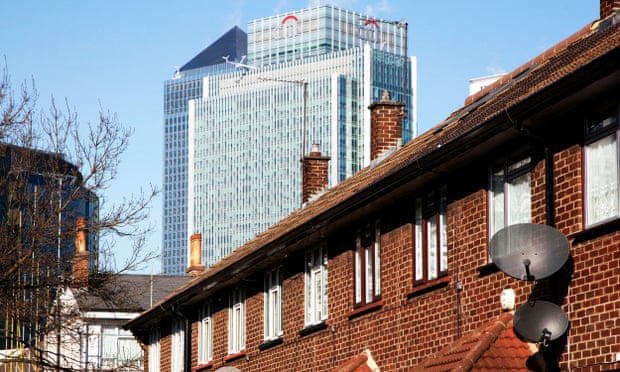House prices in London have recorded their first annual fall in nearly a decade, according to government figures showing gains in every other region across the country.
In the latest sign that the property market in the capital is slowing down, figures from the Office for National Statistics show the average price of a home in London fell by almost £5,000 over the 12 months to February.
Despite prices rising in some areas of the capital, the central borough of Tower Hamlets, skirting the eastern edges of the City of London and encompassing the financial district of Canary Wharf, recorded the steepest falls – with average prices down by almost 8%. The average price of a home for the capital as a whole was £471,986, down from a peak of £488,247 last July.
For the UK as a whole, the growth rate slowed to 4.4% in the year to February, having risen at an annual rate of 4.7% a month earlier. Just as prices dropped in London by 1% over the course of the year there were strong gains elsewhere, including Scotland and the Midlands, where property values rose by more than 6%.
The shifting fortunes for the British property market underscore the impact of Brexit uncertainty and increases in stamp duty, which have cut the number of average sales – particularly for pricier homes in the capital. Before the financial crisis there were as many as 1.6m property transactions each year, though this number has since slumped to about 1msince 2014.
Liam Bailey, the head of research at the estate agents Knight Frank, said increasing stamp duty costs in recent years had made buying a property “fundamentally much more expensive than it was a decade ago”.
While the market was nowhere near as bad as 2009 and there was some uncertainty triggered by Brexit, he said: “[Stamp duty has meant] transaction volumes are lower as people are buying and staying put for longer.”
While the long-term behavioural change for people to move less has depressed activity in the housing market, the decline in London may raise hope among first-time buyers that homes could be becoming more affordable.
Research from the Resolution Foundation thinktank this week suggested up to one in three of Britain’s millennial generation will never own their own home, with many likely to live and raise families in insecure, privately rented accommodation throughout their lives.
While house prices in London remain out of reach for many people on average salaries, homes elsewhere across the country are more affordable. The lowest average price continued to be in the north-east at £128,000. The average national house price was £225,000, an increase of £9,000 from February 2017.
Prices are rising from a much lower base outside of London and the south-east, having taken longer since the financial crisis to start increasing again. But a shortage of homes being built across the country could put pressure on prices to rise further still over the coming years.
High levels of employment and the gradual return of rising real wages, as the inflationary effects of the Brexit vote begin to fade, should also push property values higher for the time being. Craig McKinlay, sales director at the mortgage lender Kensington, said: “There is no quick-fix for the government here, only long-term investment in housing infrastructure will help alleviate the situation.”
According to figures from the Bank of England, the number of mortgage approvals in February fell to 63,910, sliding below the six-month average, suggesting there could be further weaker activity to come in the housing market.
There could also be greater pressure should the Bank raise interest rates next month, pushing up the cost of a mortgage and acting as a further drag on the value of UK property.
According to the consultancy Capital Economics, annual growth will remain subdued over the next few years, while prices in London could fall by up to 3% this year and 5% in 2019.
Howard Archer, the chief economic adviser to the EY Item Club, the economic forecasting group, said: “Housebuyers will likely be concerned about further interest rate hikes over the coming months.”


